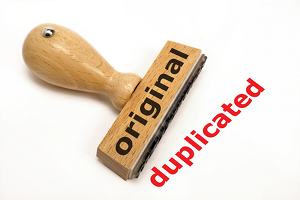 Facebook, online advertising agency adSage, and a web-based wholesaler of Chinese goods are named as defendants in a new class-action trademark lawsuit accusing them of enabling the placement of, or placing ads for, counterfeit NFL apparel on the social network. (read it below)
Facebook, online advertising agency adSage, and a web-based wholesaler of Chinese goods are named as defendants in a new class-action trademark lawsuit accusing them of enabling the placement of, or placing ads for, counterfeit NFL apparel on the social network. (read it below)
Inkies Sports, Inc. d/b/a Krystal’s NFL Shoppe, a New Mexico-based retail store that only sells “officially licensed NFL merchandise” filed suit. Krystal’s charges that a litany of ads on its Facebook page offer competing, counterfeit merchandise at prices that can be 80% – 90% below the MSRP of an authentic, officially licensed NFL jersey.
But should Facebook and advertising agencies be held accountable for alleged wrongdoings of third party advertisers accused of hawking cheaper counterfeit goods? Prior case law suggests not.
Two years ago a federal appeals court held that eBay was not liable to Tiffany, Inc. for trademark infringement or dilution by offering Tiffany goods for sale that third parties listed for sale. It sent the case back to a lower court to further examine Tiffany’s false advertising claim, and determine whether extrinsic evidence showed that advertisements misled or confused consumers about Tiffany products offered for sale. The U.S. District Court ultimately ruled that eBay was not liable for false advertising, since it failed to obtain survey data showing that a substantial portion of consumers were misled.
That may also be a challenge for Krystal’s NFL Shoppe in this case. The store will have to prove that a significant number of consumers were misled into thinking that they were buying officially licensed NFL merchandise at substantially reduced prices.
Krystal’s complains that “[t]he [I]nternet is rife with accounts of unsuspecting consumers being fooled into purchasing what they thought to be officially licensed NFL merchandise that turned out to be maintained by counterfeiters.” The company alleges that consumers contacted it after Facebook ads allegedly “led [them] to believe that Krystal’s was somehow responsible for, or in league with, the counterfeiters.”
That claim may be difficult to support.
If the court looks to the eBay case for guidance, it will likely find that Facebook lacks a legal obligation to make sure that every ad on the social network is only for officially licensed products before the ads are either sold, or appear live on site. If the company is notified by trademark or copyright holders about alleged infringement, it says it takes action.
Will Rogers once observed that “[a]dvertising is the art of convincing people to spend money they don’t have for something they don’t need.” Convincing folks to buy high-priced officially licensed goods instead of knock-off products will remain even harder.
View the class-action complaint against Facebook, adSage, and other defendants by Krystal’s NFL Shoppe here:
Class Action Complaint (Inkies Sports, Inc. d/b/a Krystal’s NFL Shoppe v. Facebook, Inc. et al)
Image credit: filmfoto via Shutterstock
